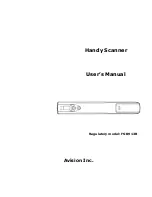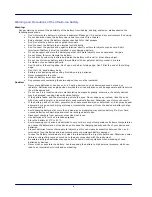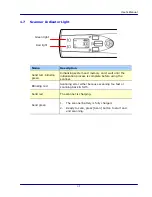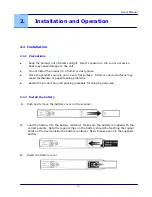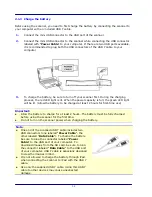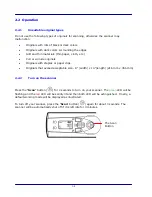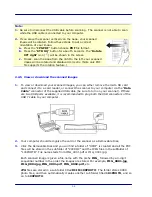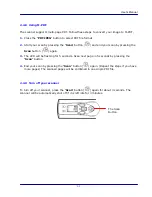
Warning and Precautions of the lithium-ion battery
Warning:
Danger warning to prevent the possibility of the battery from leaking, heating, explosion, please observe the
following precautions:
•
Don’t immerse the battery in water and seawater. Please put it in cool and dry environment if no using.
•
Do not discard or leave the battery near a heat source as fire or heater
•
Being charged, using the battery charger specifically for that purpose
•
Don’t reverse the positive and negative terminals
•
Don’t connect the battery to an electrical outlet directly.
•
Don’t connect the positive and negative terminal directly with metal objects such as wire. Short
terminals of battery is strictly prohibited, it may damage battery.
•
Do not transport and store the battery together with metal objects such as necklaces, hairpins.
•
Do not strike, throw or trample the battery.
•
Do not directly solder the battery and pierce the battery with a nail or other sharp object.
•
Do not use lithium ion battery and others different lithium polymer battery model in mixture.
•
Prohibition of use of damaged cells.
•
Don’t bend or fold sealing edge. Don’t open or deform folding edge. Don’t fillet the end of the folding
edge.
•
Don’t fall, hit, bend battery body.
•
Battery pack designing and packing Prohibition injury batteries.
•
Never disassemble the cells.
•
Keep the battery away from babies.
•
Any components contacting these two edges, they must be insulated.
Caution:
•
Never place batteries or devices on or in heating devices, such as microwave ovens, stoves, or
radiators. Batteries may explode when overheated or its performance will be degenerate and its service
life will be decreased.
•
Do not use it in a location where is electrostatic and magnetic greatly, otherwise, the safety devices
may be damaged, causing hidden trouble of safety.
•
If the battery leaks, and the electrolyte get into the eyes. Do not wipe eyes, instead, rinse the eyes
with clean running water, and immediately seek medical attention. Otherwise, eyes injury can result.
•
If the battery gives off an odor, generates heat, becomes discolored or deformed, or in any way appear
abnormal during use, recharging or storage, immediately remove it from the device or battery charge
and stop using it.
•
Avoid charging batteries for more than a week, as overcharging may shorten battery life. Over time,
unused batteries will discharge and must be recharged before use.
•
Disconnect chargers from power sources when not in use.
•
Use batteries only for their intended purposes.
•
Store the battery at 0°C to 40°C.
•
Avoid exposing your device and batteries to very cold or very hot temperatures. Extreme temperatures
can cause the deformation of the device and reduce the charging capacity and life of your device and
batteries.
•
Prevent batteries from contacting metal objects, as this can create a connection between the + and –
terminals of your batteries and lead to temporary or permanent battery damage.
•
In case the battery terminals are dirt, clean the terminals with a dry cloth before use. Otherwise power
failure or charge failure may occur due to the poor connection with the instrument.
•
Be aware discharged batteries may cause fire. Follow all local regulations when disposing of used
batteries or devices.
•
Never crush or puncture the battery. Avoid exposing the battery to high external pressure, which can
lead to an internal short circuit and overheating.
iv

